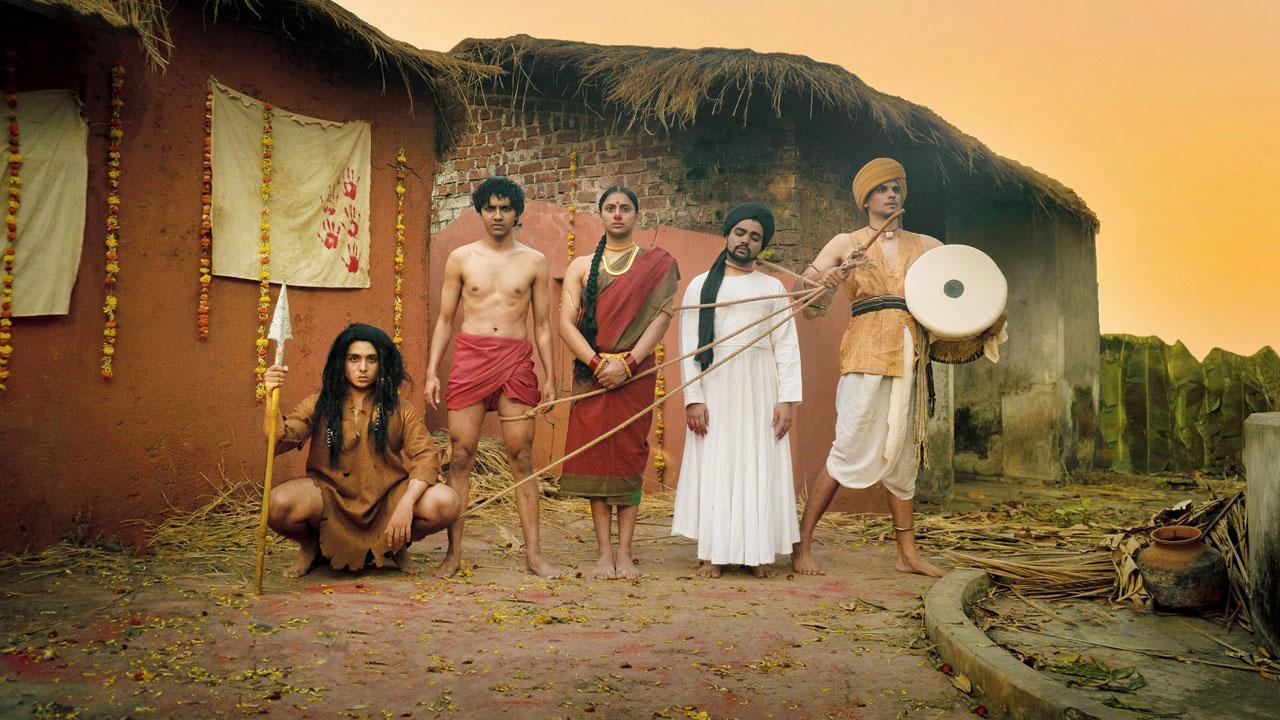With their debut album, the young folk-fusion band Inayat makes a splash on the city’s musical narrative

(From left) Kanishk Ajmera, Tanay Shah, Ritik Mehta, Abhishek Venkitakrishnan and Jordan Machado in a moment from the music video
Experimental is often a term that is abused and overused in the genre of music. Very few musicians truly manage to be experimental without sounding facetious. The city-based band Inayat brings to the spotlight a different soundscape fuelled by mythological narratives, familiar Indian legends and themes in their debut album, Danka.
ADVERTISEMENT
Formed in 2017 by friends Abhishek Venkitakrishnan and Ritik Mehta, the band began as a duo with common interests. Mehta explains, “Abhishek is trained in Carnatic classical, while I am trained in blues and jazz. We had a shared interest in music, fusion and Coke Studio compositions. When Tanay [Shah] joined us, we added on his narratives and lyric-writing.” Soon, Kanishk Ajmera (drummer) and Jordan Machado (bassist) signed on for sessions as the final pieces of the puzzle.
The resultant album, Danka, is the product of a team that has been shaped over the last six years. “The album was created while we were on a plane during a trip to Goa,” 24-year-old Mehta shares. The five-song album is a curation of narratives that range from Hindu mythology, Sufism to environmental self-awareness and existentialism. The lyrics blend influences of ancient literature, Hindi poetry and philosophy to fusion rhythms. Where Venkitakrishnan brings his soulful Carnatic-trained vocals into act, the simmering build-up of the chords on tracks such as Surpanakha, Mowgli and tracks like Anal haq and Danka make the album fascinating to experience. There is variation, groovy rhythms and a touch of folksy charm that make the songs enjoyable.
The narrative and myths form a crucial part of the album, says Shah. An engineer who is now pursuing filmmaking in New York, Shah explains, “I grew up listening to stories from Ramayana and The Jungle Book.” While the track Surpanakha revisits the nature of the infamous character from the Ramayana; Mowgli, he says, was born out of the Aarey protests of 2019. “Ritik and I were witnesses to those protests. The song is our take on what Mowgli would make of this world of ours,” Shah remarks.
The sound is remarkably folksy, despite the addition of Machado’s bass and Ajmera’s percussion. It was a purposeful choice, remarks Shah. “The narrative of these songs meant that we composed with an emphasis on folk rhythm or lok geet. We wanted to keep them as hummable as possible, to give them an earthy and authentic vibe,” he reveals.
This aesthetic also extends to the visuals. In the snippety video that accompanies the songs, the band dresses up as characters with a touch of avant-garde folk. Conceived by Kriti Edwankar and Mehta, who also run the production company Pencil and Frames, the visuals were shot at the village of Edvan near Palghar. “We wanted the imagery to reflect the theatrical roots of our inspirations and the myths,” says Mehta. Cue the composer dressing up as Surpanakha, with Shah taking on the role of Mowgli.
Yet, it is the music and its slow-burning lyrics that are left behind long after one has completed a listening session. It is a good sign for a band that is now set to release their next single, Mela, in 2024. “We have finally discovered our sound. While we won’t stop experimenting, we hope to explore it further,” summarises Venkitakrishnan.
Log on to: Danka on Spotify; YouTube
 Subscribe today by clicking the link and stay updated with the latest news!" Click here!
Subscribe today by clicking the link and stay updated with the latest news!" Click here!







